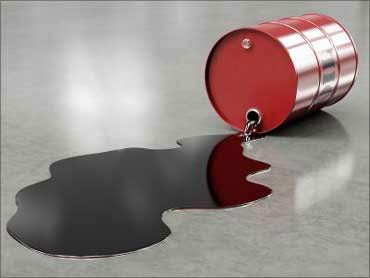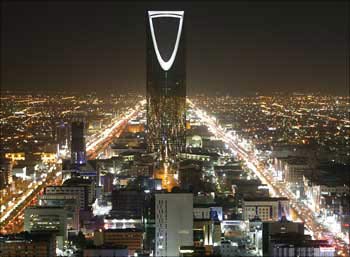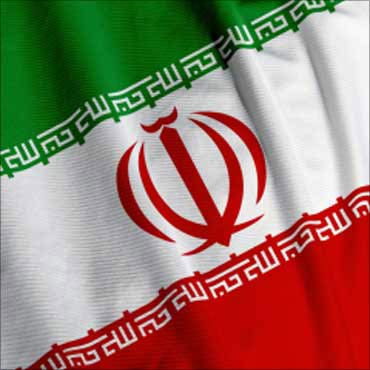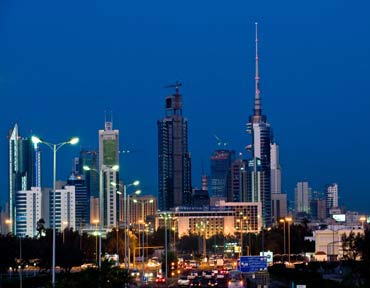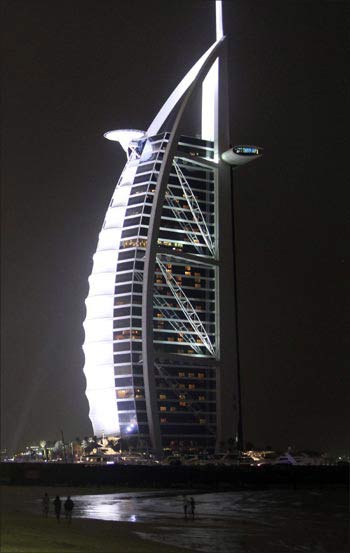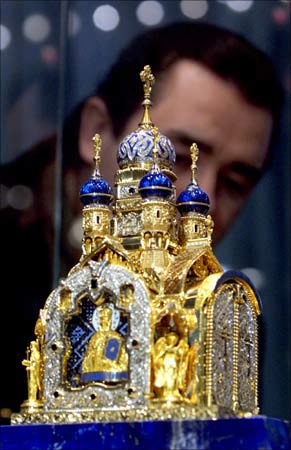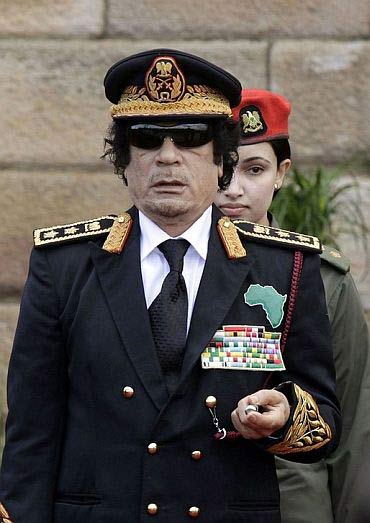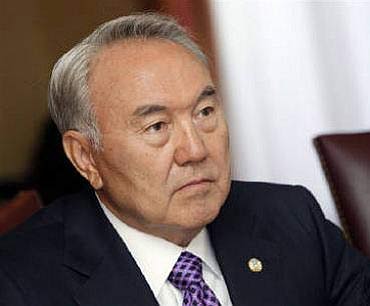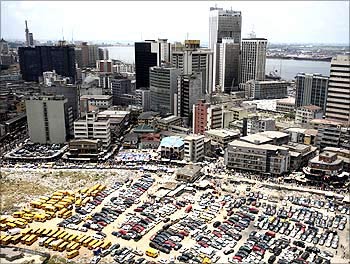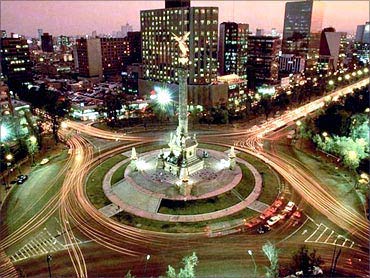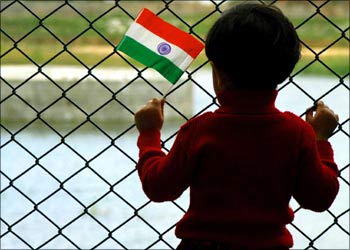 | « Back to article | Print this article |
Nations with the world's largest oil reserves
Oil is the prime energy source on earth today. And with nations like India and China growing rapidly, their energy needs too are galloping. The global consumption of oil has thus soared, with the United States consuming the most. China is the second-largest consumer and India the fourth largest consumer of oil in the world.
Petroleum prices are going through the roof in India on the back of global crude oil prices rising. With the government having deregulated petrol prices, market forces now dictate petrol tags.
However, the world is now grappling to find alternative sources of energy as oil is slowly running out. Although the world has enough oil to last it for some more years, it is not an unlimited resource.
So which nations have the largest oil reserves in the world? Click NEXT to check out . . .
Sources: BP Statistical Review of World Energy, Wikipeida, NationMaster
Nations with the world's largest oil reserves
1. Saudi Arabia
The Kingdom of Saudi Arabia has the world's largest oil reserves, with almost 20 per cent of the Earth's oil share with it.
The West Asian nation is said to have close to 266 billion barrels of oil lying under its vast deserts.
West Asia, perennially hit by strife and war, has about 57 per cent of the world's oil reserves.
Saudi Arabia is also the largest oil producer of the Organization of the Petroleum Exporting Countries. It consumes 2.4 million barrels per day. Saudi Arabia has one-fifth of the world's proven oil reserves, 266.751 billion barrels.
Click NEXT to read on . . .
Nations with the world's largest oil reserves
2. Venezuela
A major member of the Organisation of the Petroleum Exporting Countries, Venezuela has the world's second largest proven oil reserves at 180 billion barrels.
Venezuela, meanwhile, has claimed that it has oil reserves to the tune of 297 billion barrels.
However, for the sake of this study figures from resources like NationMaster and BP Statistical Review of World Energy have been taken and thus Venezuela has been put in the second place behind Saudi Arabia.
Venezuela is Latin America's leading exporter of crude oil.
Click NEXT to read on . . .
Nations with the world's largest oil reserves
3. Canada
Canada has oil reserves to the tune of 178 billion barrels, but experts say that Canadian oil is locked in such difficult spots that it would be prohibitively expensive to extract it.
Canada is a net exporter of oil, natural gas, coal, and electricity. A top supplier to the United States, Canada consumes 2.3 million barrels per day.
The country's total production stands at 3.35 million barrels per day. It has total proven reserves of 178.59 billion barrels.
Click NEXT to read on . . .
Nations with the world's largest oil reserves
4. Iran
Iran has slightly over 10 per cent of the entire world's oil reserves, the fourth largest on earth. It is said to have crude reserves of over 150 billion barrels.
Iran could have made more progress in the area of oil and gas production, but it has constantly been mired in some controversy or the other due to its aggressive posture in acquiring nuclear arms and has been subjected to world sanctions.
Click NEXT to read on . . .
Nations with the world's largest oil reserves
5. Iraq
According to the BP Statistical Review of World Energy, war-ridden Iraq has the world's fifth largest oil reserves.
It has about 143 billion barrels of oil, or about 8.5 per cent of the world's share.
Click NEXT to read on . . .
Nations with the world's largest oil reserves
6. Kuwait
With oil reserves of 101.5 billion barrels, Kuwait has the world's sixth largest oil reserves. That accounts for about 7.5 per cent of the world's total reserves of crude oil.
Petroleum and petroleum products now account for nearly 95 per cent of Kuwait's export revenues, and 80 per cent of government income.
Kuwait is regarded as one of the most economically developed countries in the Arab League. Kuwaitis also have the tenth highest per capita income in the world.
Click NEXT to read on . . .
Nations with the world's largest oil reserves
7. United Arab Emirates
The United Arab Emirates has a highly developed economy, and has a rich source of revenue in tourism and its huge oil reserves. With 7.3 per cent of the world's share of oil, the UAE ranks seventh.
It has about 98 billion barrels of oil.
The UAE also has a per capita income of over $50,240, which is the 13th highest in the world.
Click NEXT to read on . . .
Nations with the world's largest oil reserves
8. Russia
A major oil producer, Russia consumed 2.9 million barrels per day in 2008. Russia's total oil production in 2008 stood at 9.7 million barrels per day.
Russia has proven oil reserves of about 74 billion barrels, which is about 5.5 per cent of the world's total reserves.
Russia has the world's largest natural gas reserves, the second largest coal reserves and the eighth largest oil reserves.
Click NEXT to read on . . .
Nations with the world's largest oil reserves
9. Libya
Libya has about 45 billion barrels as oil reserves. It has the world's ninth largest oil reserves, about nine times what India has.
The Libyan economy heavily depends on its oil resources, with petroleum accounting for a major chunk of its revenues.
Click NEXT to read on . . .
Nations with the world's largest oil reserves
10. Kazakhstan
Kazakhstan has about 3 per cent, or 40 billion barrels of oil. It has the world's 10th largest oil reserves.
Energy thus is the nation's economic mainstay. It earns over $15 billion through export of crude.
Click NEXT to read on . . .
Nations with the world's largest oil reserves
11. Nigeria
Nigeria has oil reserves of about 37 billion barrels, the 11th largest in the world. It accounts for about 2.7 per cent of total global oil reserves.
The African nation is also the 12th largest producer and eighth largest exporter of petroleum. It has a production capacity of about 2 million barrels a day.
Click NEXT to read on . . .
Nations with the world's largest oil reserves
12. Mexico
At just over 33 billion barrels of oil, Mexico has the world's 12th largest oil reserves.
One of the fastest growing economies in the world, Mexico is also the sixth-largest oil producer of oil, with a capacity of 3.7 million barrels per day.
Click NEXT to read on . . .
Nations with the world's largest oil reserves
13. Angola
Angola has about 25 billion barrels of oil reserves, making its reserves the 13th largest in the world.
The African nation has an oil production capacity of about 1.4 million barrels per day. It joined the OPEC in 2006.
Click NEXT to read on . . .
Nations with the world's largest oil reserves
14. United States
The proven oil reserves that America has are said to be to the tune of 22.5 billion barrels. It has a total oil production of 8.5 million barrels per day.
The United States is the world's largest consumer of oil. It used 19.5 million barrels per day in 2008.
The US government increased its crude-oil price forecast for 2010 this week based on an outlook for higher demand as the global economy recovers.
America's per capita income is $47,240. It's the 17th-highest in the world.
Click NEXT to read on . . .
Nations with the world's largest oil reserves
15. China
China's total oil reserves amount to 18.2 billion barrels. Its total oil production stands at 4 million barrels per day. China has the world's 15th largest oil reserves.
Despite slowdown in exports and domestic demand in the past year, China's demand for energy remains high.
China consumed 7.8 million barrels of oil per day in 2008. With real gross domestic product growing at a rate of 8-10 per cent a year, China's need for energy is projected to increase by 150 per cent by 2020.
China's per capita income is $3,590. It ranks 124th in the world in terms of per capita income.
China is the world's second largest economy, with its GDP standing at slightly more than $7 trillion. India, by comparison, touched the $1-trillion mark in 2007.
Click NEXT to read on . . .
Nations with the world's largest oil reserves
India
Surprised? Yes, according to reports, India has the world's 21st largest oil reserves. The total oil reserves amount that India has amount to 5.625 billion barrels.
With a high rate of economic growth, India has become a significant consumer of energy resources. India's oil consumption has risen to 3 million barrels per day in 2008, from 643,000 barrels of oil per day in 1980.
Despite the economic crisis, India's energy demand continues to rise steadily. India's total oil production is about 883,510 barrels per day.
